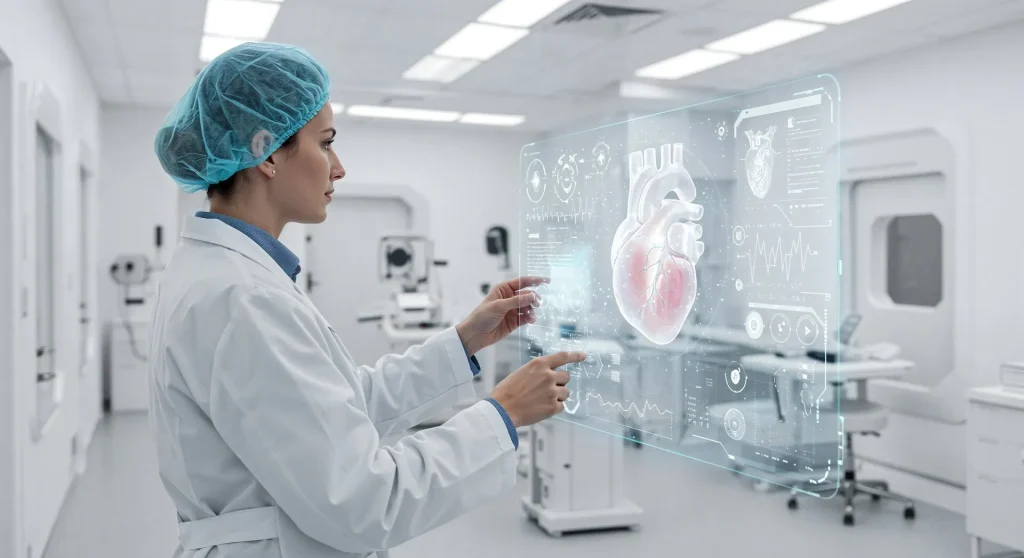The healthcare industry faces unprecedented challenges—rising costs, staffing shortages, and growing patient demands. Automation in healthcare is emerging as a critical solution, enabling organizations to streamline operations, reduce errors, and deliver higher-quality care
Automation isn’t just about replacing humans—it’s about augmenting their capabilities. Below are the most impactful advantages:
1 . Cost reduction
Automated systems minimize manual labor, reduce overtime, and lower error-related expenses. For example, CAQH reports that automation has already saved the industry $122 billion in administrative costs, with potential savings of $16 billion more through full adoption
2. Enhanced patient care
AI tools like machine learning algorithms analyze medical images faster and more accurately than humans, aiding in early disease detection36. Automated insulin delivery systems also ensure precise treatment for chronic conditions
3. Streamlined administrative workflows
Tasks like schedule appointments, claims processing, and patient onboarding consume 30% of healthcare costs. Automation tools, such as self-scheduling platforms and chatbots, cut processing times by up to 85%


| Area | Example | Impact |
|---|---|---|
| Diagnostics | AI-powered image analysis for cancer detection | 40% faster diagnoses |
| Patient communicat | Automated SMS reminders | 43% reduction in no-shows |
| Data management | EHR integration with AI analytics | 75% fewer errors in records |
AI-powered image analysis for cancer detection
Automated SMS reminders
EHR integration with AI analytics
40% faster diagnoses
43% reduction in no-shows
75% fewer errors in records
While automation offers transformative benefits, healthcare companies must navigate hurdles:
Upfront investments in AI and RPA tools can be significant, though long-term ROI offsets this
Training programs and transparent communication help alleviate fears about job displacement
HIPAA-compliant platforms ensure patient data remains protected during transfers
While challenges like costs and resistance exist, healthcare companies can adopt phased automation solutions, upskill staff, and use HIPAA-compliant tools. Partnering with experts like Godev ensures secure, cost-effective transitions that prioritize patient data protection and long-term ROI

Emerging trends highlight a shift toward predictive and personalized care:
Automated remote monitoring tools track vital signs in real time, reducing hospital readmissions
AI accelerates molecular analysis, cutting development timelines by years
Machine learning predicts staffing needs during flu seasons or emergencies, optimizing resource allocation
AI and digitization and automation are reshaping care into proactive, personalized models. By collaborating with tech partners like Godev, healthcare companies can ethically scale innovations while maintaining compliance and human-centric values
Automation is revolutionizing every corner of healthcare, from front-desk operations to complex clinical workflows. Below are key areas ripe for automation:
Diagnostics. AI-powered tools analyze radiology images, pathology slides, and genomic data with 95%+ accuracy, reducing diagnostic delays
Medication management. Automated dispensers track dosages and alert staff about conflicts or missed doses
Prior authorization. AI reviews insurance criteria and patient histories to approve requests in minutes instead of days
Claims processing. Automation detects billing errors and resolves 80% of denials before submission
Staff scheduling. Algorithms factor in shift preferences, certifications, and patient influx to optimize rosters

Electronic health records (EHR). Natural Language Processing (NLP) extracts insights from unstructured clinical notes
Predictive analytics. Machine learning identifies high-risk patients for early interventions, cutting readmissions by 25%
Remote monitoring. Wearables track glucose levels, heart rates, and oxygen saturation, alerting providers to anomalies
Chatbots. 24/7 virtual assistants answer FAQs, reducing call center volumes by 40%
| Use case | Technology | Outcome |
|---|---|---|
| Johns Hopkins Hospital | AI sepsis detection system | 20% reduction in mortality rates |
| Mayo Clinic | Automated prior authorization | 90% faster approvals |
| NHS (UK) | Robotic process automation (RPA) | $150M saved annually in admin costs |
| Teladoc health | AI-driven telehealth triage | 30% improvement in appointment accuracy |
AI sepsis detection system
Automated prior authorization
Robotic process automation (RPA)
AI-driven telehealth triage
20% reduction in mortality rates
90% faster approvals
$150M saved annually in admin costs
30% improvement in appointment accuracy








As healthcare companies embrace digitization and automation, choosing the right partner is critical. Godev delivers:
We build solutions adhering to GDPR, HIPAA, and HITECH standards
Training programs and transparent communication help alleviate fears about job displacement
HIPAA-compliant platforms ensure patient data remains protected during transfers